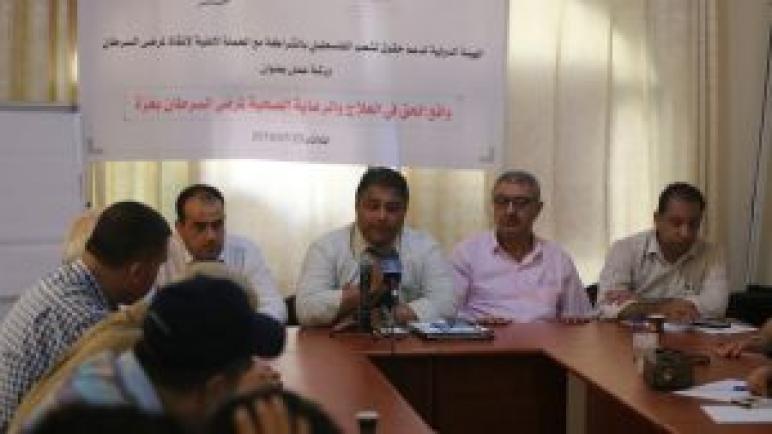
During a meeting organized by the International Commission (ICSPR) … community members stress the need to address the obstacles and challenges that threaten the lives of cancer patients
NO: 32 /2019
Date :23 Jul 2019
During a meeting organized by the International Commission (ICSPR) … community members stress the need to address the obstacles and challenges that threaten the lives of cancer patients
Occupied Palestine / Gaza: The International Commission to Support Palestinians’ Rights (ICSPR) organized today morning, Tuesday 23 July 2019, a workshop entitled:“ The reality of the right to treatment and health care for cancer patients in Gaza ”, at the headquarters of the Commission in Gaza City, in which a group of specialists representing the Ministry of Health, an elite of health institutions, representatives of civil society institutions, and youth activists participated.
Dr. confirmed. Muhammad Abu Salmiya, director of Al-Rantisi Children’s Hospital, said that the health sector in the Gaza Strip suffers from many crises, especially cancer patients, most notably the shortage of medicines and fuel, the shortage of medical personnel, the prevention of transfers for treatment abroad, and the Ramallah authority preventing the transfer of cases to Israel.
And he stressed that cancer patients have privacy, as if the patient does not receive the necessary treatment, he faces two options, either the outbreak of the disease in his body, or death.
Abu Salmiya noted that the number of cancer patients in the Gaza Strip is estimated at 8,000 patients, among them 600-700 children, who face severe health conditions, due to the continuous shortage of medicines, medical supplies, and diagnostic and therapeutic devices needed to treat them, and the shortage of professional doctors specializing in oncology, and an exacerbation fuel crisis in hospitals and the continuing electricity crisis.
On his part, Kamal Hamdan, from the National Campaign to Save Cancer Patients, spoke about the “Hope and Peace” campaign, saying: “We are a group of doctors, engineers, university professors, businessmen and well-known personalities. We decided not to continue to see the pain of cancer patients without having a hand in changing this reality”.
He stressed that the civil campaign to save cancer patients in the Gaza Strip is a civil humanitarian campaign far removed from politics and ideology, through local and international Palestinian humanitarian efforts, and a global vision open to all good people around the world.
In turn, journalist Fathi Sabah, director of the Palestinian Institute for Communication and Development, spoke about the Palestinian Authority’s decision to stop transferring to Israeli hospitals, stressing that before implementing this decision, it should have provided alternatives for patients who have treatment protocols, especially for those with incurable diseases and provide them with the necessary treatments.
He explained that the Palestinian government is responsible, according to the law and the constitution, for treating patients and providing what they need through the donations from donor countries, and taxes, which must be returned to the citizen in general and to patients in particular in the form of services.
Sabah spoke about the difficult economic situation of the majority of cancer patients in the Gaza Strip, pointing out that many of them cannot provide treatment or transportation, which exacerbates their suffering.
At the conclusion of the meeting, participants stressed the need to address the obstacles and challenges that threaten the lives of cancer patients, neutralize the health sector political disputes and conflicts, and develop strategic plans to improve health services provided to patients.





